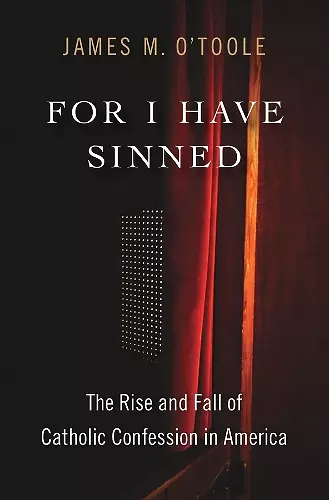For I Have Sinned
The Rise and Fall of Catholic Confession in America
Format:Hardback
Publisher:Harvard University Press
Published:28th Mar '25
Should be back in stock very soon

The remarkable story of how confession became a defining rite for American Catholics—and then, beginning in the 1970s, all but disappeared.
For generations, American Catholics went faithfully to confession, admitting their sins to a priest and accepting through him God’s forgiveness. The sacrament served as a distinctive marker of Catholic identity, shaping parishioners’ views of their relationship to God, their neighbors, and the wider world. But starting in the 1970s, many abandoned confession altogether. Focusing on the experiences of both laypeople and priests, James M. O’Toole reconstructs the history of confession’s steady rise—and dramatic fall—among American Catholics.
In the early United States, the Catholic Church grew rapidly—and with it, confession’s centrality. Although the sacrament was practiced unevenly for much of the nineteenth century, frequent confession became common by the early twentieth. Both priests and parishioners understood confession as a ritual crucial for the soul, while on a social level, it established Catholic distinctiveness within a largely Protestant country. Today, however, even faithful Catholics seldom confess. The reasons for this change, O’Toole reveals, include the emergence of psychology and other forms of counseling; the Church’s stance against contraception, which alienated many parishioners; and a growing sense of confession’s inability to confront social problems like structural racism, poverty, and sexism. Meanwhile, increasing recognition of sexual abuse within the Church further undermined trust in clergy as confessors.
Sensitively attuned to the historical importance of confession, For I Have Sinned also suggests that, if the sacrament no longer serves the needs of US Catholics, the Church and its members might find new ways to express their ideals in the twenty-first century.
[A] thoughtful account of how a once-common habit has declined ‘with a speed that may fairly be described as breathtaking.’ -- John J. Miller * Wall Street Journal *
Fascinating…provides an intriguing commentary on the evolution of the religious ritual known as confession and perceptions about what is moral and right, then and now. -- Amanda Ray * Library Journal *
Catholics in the United States used to go to confession as frequently as once a week. Now, almost none do. Why? James M. O’Toole's compelling study both answers this question and recovers an almost vanished world of kneelers and darkened boxes within churches, seminary training manuals, exhaustive lists of sins, and anxious penitents. The result is an indispensable, vital addition to the cultural history of Catholicism and a major contribution to our understanding of ethical reflection in the not-so-distant past. -- John T. McGreevy, author of Catholicism: A Global History from the French Revolution to Pope Francis
A remarkable examination of the sacrament of penance in America over the past two and a half centuries. With deft authority, O’Toole explores how confession evolved from an annual event for all but the most devout, to an encounter sought monthly or even weekly, and ultimately to one that large numbers of Catholics seldom experience. Imaginative, thoughtful, and thoroughly researched, this book is essential reading for anyone interested in the contours of American Catholicism. Social history at its finest. -- Leslie Woodcock Tentler, author of American Catholics: A History
One of the most fascinating books on American religion and culture of the last several decades. After examining the steady growth of confession among American Catholics over more than a century, James M. O’Toole asks how this exquisitely complex tradition could then all but vanish from parish life. He illuminates this astonishing implosion with empathy, insight, and discernment. -- Jon Butler, author of God in Gotham: The Miracle of Religion in Modern Manhattan
ISBN: 9780674294523
Dimensions: 210mm x 140mm x 24mm
Weight: 551g
336 pages